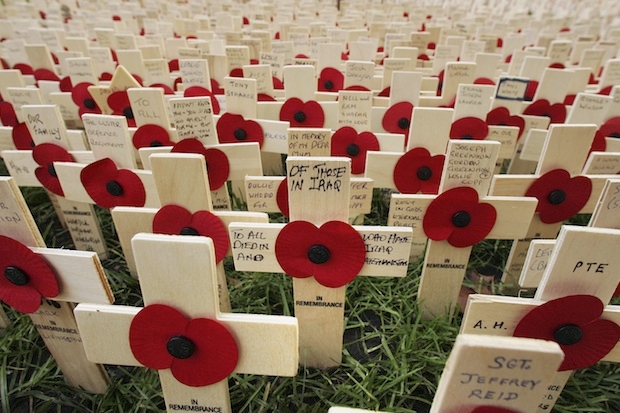The verse before Laurence Binyon’s ‘They shall not grow old…We will remember them’, is this:
They went with songs to the battle, they were young,
Straight of limb, true of eye, steady and aglow.
They were staunch to the end against odds uncounted,
They fell with their faces to the foe.
It’s reflected in an article that appeared in a 1917 Spectator under the headline ‘The Splendour of Youth’.
We may not say that the development of the noblest qualities in the flower of the nation is a justification of war, but none can deny that it is a sustaining consolation. The war has shown of what British youth is capable. The young men did not know it themselves before; nor did their friends, nor even their fathers and mothers. It is as though their hearts had been touched by a common ideal that unites them in valour and raises them to an almost incredible standard of performance. Antaeus-like they touch earth, when fortune throws them for a while out of the fight, only to rise with renewed strength…
When we reflect upon the signal powers of heart and brain displayed in this war by young men whose names have become famous, we can think of all the heroes of history as brothers of our own kith and kin rather than as shadowy and impossibly remote exemplars…
The diverse gifts of our young men have all been poured in a splendid stream into the treasury of national effort. None who has had anything to offer has failed. There has been such a uniting of purpose, such a consecration of various accomplishments, that nothing is left unaccounted for, no one is left standing outside the shining band of brothers with his talent unused in his hand.
The article argued that the greatest heroes were not just athletes but also men of imagination and genius – ‘In this war the combination of intellect with courage is what has enchanted the world and has caused onlookers to choose their heroes.’ One such man was Lord Ribblesdale’s son Charles Lister, who had died during the Battle of Gallipoli. His memoirs had been posthumously published.
Charles Lister was in the Diplomatic Service when war broke out. He might have stayed where he was with credit to himself. But he insisted on joining the Army. When he was appointed to a Headquarters Staff he pulled as many strings to get off it and into the trenches as many men would pull to get on to a Staff. He was wounded on three distinct occasions before he died.
He died of his many and painful wounds with a kind of patient recklessness of life, and with his books about him—Dante’s Purgatory, the Koran, a Turkish grammar, the Oxford Book of Italian Verse, the Life and Works of Goethe, a D’Annunzio novel, and the Invitation of Christ. His soul lives on. In the words of another member of our splendid youth who died in Flanders—words written of a friend who had just been killed— ‘He’ll carry on. It would take more than that to stop him.’
The war didn’t end till nearly two years after that article was written.
This memorable week has brought the war to an end with a complete victory for the Allies. The imposing edifice of Prussian militarism has come toppling to the ground. While the Emperor’s delegates were on their way to sue to Marshal Foch for an armistice, revolution spread rapidly throughout Germany. When the Allied terms became known at the German headquarters, the Emperor, doffing his shining armour and throwing away his broken sword, abdicated and slunk into Holland, where so many other German deserters had preceded him during the last four years. The conditions imposed on beaten Germany were accepted by Marshal von Hindenburg, and by the Socialist Government which had arisen in Berlin.
The armistice was signed at five o’clock on Monday morning, and six hours later hostilities ceased. The British armies had that morning captured Mons, thus returning to the very spot at which our little Expeditionary Force first met the German hordes in August, 1914, while the Belgians had entered Ghent, and the French and American armies had almost completed the liberation of French soil from the invader.
In fact, the whole 16th November 1918 issue is a joy to read.
The crowds are full of geniality and goodwill, and, take it all round, the fun is absolutely sane and innocent. The police are notoriously inadequate in numbers just now, but the crowds police themselves quite well enough.






Comments